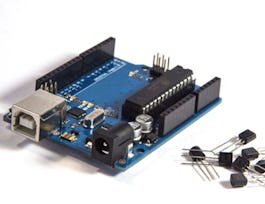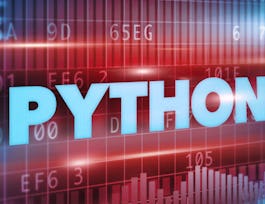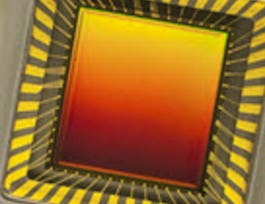The Arduino is an open-source computer hardware/software platform for building digital devices and interactive objects that can sense and control the physical world around them. In this class you will learn how the Arduino platform works in terms of the physical board and libraries and the IDE (integrated development environment). You will also learn about shields, which are smaller boards that plug into the main Arduino board to perform other functions such as sensing light, heat, GPS tracking, or providing a user interface display. The course will also cover programming the Arduino using C code and accessing the pins on the board via the software to control external devices. Please note that this course does not include discussion forums.


The Arduino Platform and C Programming
This course is part of An Introduction to Programming the Internet of Things (IOT) Specialization
Taught in English
Some content may not be translated

Instructor: Ian Harris
190,880 already enrolled
Included with 
Course
(7,046 reviews)
96%
Skills you'll gain
Details to know

Add to your LinkedIn profile
4 quizzes
Course
(7,046 reviews)
96%
See how employees at top companies are mastering in-demand skills

Build your subject-matter expertise
- Learn new concepts from industry experts
- Gain a foundational understanding of a subject or tool
- Develop job-relevant skills with hands-on projects
- Earn a shareable career certificate


Earn a career certificate
Add this credential to your LinkedIn profile, resume, or CV
Share it on social media and in your performance review

There are 4 modules in this course
This module provides an introduction to the Arduino environment which is composed of three things: the Arduino board, the Arduino IDE, and the Arduino-compatible shields together with their libraries. We first investigate the board, discussing all of its main components, inputs, and outputs. We discuss how each component is used and we examine the board schematic to see how they are connected. We then discuss the Arduino Integrated Development Environment (IDE) which is used primarily to write, compile, and upload code. We survey the interface of the IDE and discuss how to install and use it. We also examine the use of shields to extend the functionality of an Arduino-based system. We discuss how shield libraries provide a useful abstraction to facilitate programming.
What's included
9 videos4 readings1 quiz1 peer review
This module covers the basics of the C programming language which will be used to write code for the Arduino. The course first covers basic syntax, variables, and types. Most of the basic C operators are presented. Conditional statements (if, switch) and loops (while, for) are described. The concept of functions is presented together with how to define and call functions. Creation and use of global variables is explained.
What's included
9 videos4 readings1 quiz1 peer review
This module describes the composition of an Arduino program, or sketch, and the process by which it is compiled and uploaded. The Arduino IDE is a user interface for the software tools which actually compile and upload the program. We outline the use of these tools in the build process. We describe the basic structure of a sketch, including the use of the setup() and loop() functions. The main interface of an Arduino is through its pins, so we describe how to access those pins from a sketch.
What's included
10 videos3 readings1 quiz1 peer review
This module is an introduction on debugging embedded software on an Arduino. We discuss the basic debugging requirements: controllability and observability. The debugging environment available for an Arduino UNO is limited, so we describe how to use the UART communication protocol to gain controllability and observability. We present the use of the Serial library to communicate with the Arduino through the serial monitor.
What's included
9 videos4 readings1 quiz1 peer review
Instructor

Offered by
Recommended if you're interested in Software Development

University of California, Irvine

University of California, Irvine

University of California, Irvine

University of California, Irvine
Why people choose Coursera for their career




Learner reviews
Showing 3 of 7046
7,046 reviews
- 5 stars
73.35%
- 4 stars
21.38%
- 3 stars
3.67%
- 2 stars
0.83%
- 1 star
0.75%
New to Software Development? Start here.

Open new doors with Coursera Plus
Unlimited access to 7,000+ world-class courses, hands-on projects, and job-ready certificate programs - all included in your subscription
Advance your career with an online degree
Earn a degree from world-class universities - 100% online
Join over 3,400 global companies that choose Coursera for Business
Upskill your employees to excel in the digital economy
Frequently asked questions
Access to lectures and assignments depends on your type of enrollment. If you take a course in audit mode, you will be able to see most course materials for free. To access graded assignments and to earn a Certificate, you will need to purchase the Certificate experience, during or after your audit. If you don't see the audit option:
The course may not offer an audit option. You can try a Free Trial instead, or apply for Financial Aid.
The course may offer 'Full Course, No Certificate' instead. This option lets you see all course materials, submit required assessments, and get a final grade. This also means that you will not be able to purchase a Certificate experience.
When you enroll in the course, you get access to all of the courses in the Specialization, and you earn a certificate when you complete the work. Your electronic Certificate will be added to your Accomplishments page - from there, you can print your Certificate or add it to your LinkedIn profile. If you only want to read and view the course content, you can audit the course for free.
If you subscribed, you get a 7-day free trial during which you can cancel at no penalty. After that, we don’t give refunds, but you can cancel your subscription at any time. See our full refund policy.

